The Spoiled Child
by Tessa Yang
When Evelyn Farnsworth noticed her daughter, Gracie, ridiculing the hunchbacked boy on the playground, her first cowardly impulse was to pretend this wicked girl was no child of hers. It was easy. So easy, Evelyn wondered why she’d never tried it before. She had only to fake deafness, bow her head, and gaze placidly at the crossword puzzle in her lap—just another mom, fending off boredom at the playground.
As a rule, Evelyn viewed crosswords as the banal pastime of precocious college students and old people desperate to prove their mental acuity (at fifty-two years of age, she had long since stopped being the former and hoped she had at least a decade before succumbing to the latter). But she’d picked up the Wednesday crossword last week in the waiting room at the dentist, just to give it a go, and was annoyed to learn she could only solve a half a dozen clues. Since then she’d been carrying the crossword around with her everywhere, hopeful that each change in environment would inspire her with another answer—a theory which had so far proven untenable. After all, if a Sunday afternoon trapped at the playground didn’t help her think of a four-letter synonym for “inane,” Evelyn didn’t know what would.
Still she persevered, alone on her bench near the merry-go-round, tuning out the chitchat of the young moms and the squeals of their children, until a flurry of motion made her look up to see her daughter and the hunchbacked boy wrestling on the ground.
By the time Evelyn got there, it was all over, the kids having been separated by a dad on scene. The hunchbacked boy sobbed into the breasts of his babysitter, but Gracie maintained a fierce, unbroken scowl until Evelyn had marched her back to the bench. Then her small face crumpled. Her shoulders began to shake.
“He—pulled—my—hair,” she whimpered, each syllable tight with the effort of restraining full sobs.
When Evelyn had gotten engaged to an Asian man, her mother had warned her that their children would look nothing like her. “No problem,” Evelyn had said. “If I’m displeased with the results, I’ll just return to sender.” Her mother had been correct as far as Evelyn’s boys were concerned. Cal and Roger were Allens in miniature, right down to the wild cowlicks in their thick dark hair. Evelyn used to get outraged when people asked “where she had gotten them,” as if she were some crazy white lady who kidnapped Asian babies at the mall.
Gracie, a surprise pregnancy, had also been a surprise to look at: Evelyn’s green eyes and pointed chin and even traces of Evelyn’s blondeness, visible as faint reddish highlights in Gracie’s brown hair. No one ever thought she was adopted. Instead they said, “Like mother, like daughter” or “She has your eyes.”
Tears sparkled on Gracie’s cheeks. Evelyn wiped them away with her thumbs. This was not the first conflict her daughter had been involved in. Gracie was bossy and defiant and proud. She seemed to dislike other children, or to think herself better than them. What few play-dates Evelyn had arranged ended with Gracie sealing herself up in her room, leaving the chattering playmate to trail Evelyn around the house. There were emails from school. Parent-teacher conferences that felt like criminal trials. Evelyn supposed this ought to be a long-delayed Teaching Moment on her part, a chance to quote the golden rule and explain that teasing special kids was wrong.
But hadn’t Gracie suffered enough?
The merry-go-round squeaked, and children screeched joyfully, and Evelyn saw on her daughter’s stunned, tear-streaked face the dismay at having had her first real encounter with violence. Some innocence had gone out of her. Some sense of safety had been snuffed out.
Suddenly, Evelyn wanted nothing more than to wrap her daughter in her arms and murmur that things would be all right, which she did, right there on the playground, kneeling in the overgrown grass.
“How about we go out for ice cream?” murmured Evelyn. “Would you like that?”
She felt Gracie’s head nodding against her.
Evelyn rose and led the way to the parking lot. She felt weary, wrung out like a dishrag. She had worked as a full-time accountant all through her sons’ upbringing and had never expected her role as stay-at-home mom to be more demanding than her career. But she was confident that her course of action had been correct. Gracie had learned a hard lesson. They would drive to the dairy, eat some ice cream, maybe pick up something on the way home for dinner. And that would be that.
But of course, that was not that. That could never ever be just that, because the next day, when Evelyn was idling in the parking lot of Cleary Road Elementary, poring over her crossword while the rest of the moms left their cars to gossip in the sunshine, someone approached her Subaru and rapped on the half-lowered window.
Evelyn looked up from her crossword, which she’d spread across the steering wheel. An unfamiliar woman stood beside her car, half bent, so that she and Evelyn were eye-to-eye.
“Hi there.” The woman smiled. She was younger than Evelyn—who wasn’t these days?—and she had the slim shoulders and small, perky breasts of a J.C Penney store mannequin. Her blonde hair jutted from the back of her head in a short ponytail. She wore fluorescent spandex, as if she’d been called away in the midst of a workout. “I’m so sorry to bother you, Mrs. Farnsworth,” said the stranger. “One of the other moms pointed out your car. I’m Fiona Waters. Arthur’s mom?”
“Oh,” said Evelyn. She was baffled. Who the hell was Arthur? The woman continued to smile too widely, like someone who had something to sell. And then it hit her. Oh shit, Evelyn thought. Mother Hunchback. In the flesh.
She took off her seatbelt and climbed out of the car. The day was cloudless and beautiful. The shaggy heads of willow trees tossed and nodded in the breeze, sending shadows skittering across the pavement. Fiona Waters shook Evelyn’s hand. Her stubby nails were flaked with fading pink polish and bitten down to the skin.
“I was so sorry when Kara told me what happened yesterday at the playground,” said Fiona. “I wish I could have been there to handle it. We don’t use a sitter very often, but my husband’s hospital was sponsoring a charity golf tournament downtown. I want you to know,” she said, her voice quiet now, conspiratorial, “that I had a very serious talk with Arthur about his behavior. He had no right to lay a hand on your daughter, no matter what she said.”
“Oh. Thanks,” said Evelyn, taken aback. “I mean, yeah, I had a pretty good talk with Gracie, too.”
Fiona smiled again. There was something about her, a fake quality that did not exactly make her unpleasant, though it put Evelyn on edge. Also she didn’t like Fiona’s wording, no matter what she said, as if Gracie had uttered a disgusting racial slur, when probably she’d just wanted to know what the deal was with that hump.
The bell shrieked from inside the elementary school. The doors flew open and children tumbled out like jelly beans from a split bag.
“Break’s over,” said Evelyn. “Back to the grind.”
Fiona laughed, but made no effort to walk away. “You know,” she said, “Arthur is turning eight this weekend. We’re having a little celebration at the house. We’d love it if Gracie would attend.”
“Of course,” said Evelyn. She knew a challenge when she heard one. She took out her phone to make a note of the time and address.
“It’ll be a good opportunity for them to smooth things over,” said Fiona. “I just think it’s so important for kids to move past their differences. Don’t you?”
A few seconds after she had left, Gracie appeared at the car, holding some clay monstrosity from art class. She thrust it into Evelyn’s hands as she climbed into the back seat.
“What’s this supposed to be?” asked Evelyn.
“It’s a giraffe,” said Gracie.
Evelyn looked at the thing, turning it a few different ways in her hands.
“It’s a giraffe that’s been hit by a bus,” clarified Gracie.
That night, when her husband got home from work, Evelyn informed him that Gracie had been invited to a birthday party.
“That’s nice,” said Allen.
Evelyn wanted to tell him that it was not nice. That it was a trap, designed to pit one mother against another in the type of smiling warfare she had not participated in since high school. But Allen was taking off his tie, washing his hands at the sink, eyes staring blankly at his reflection in the darkened kitchen window in a way that meant he was already thinking about something else. And truthfully, Evelyn was embarrassed, having nothing to show for her day but petty squabbles between moms in the elementary school parking lot.
Gracie joined them at the table for her dinner, separately cooked, because she ate only variations of mac and cheese and a few slender green beans if you were lucky, drank only chocolate milk or lemonade out of the glass with the twirly straw. Bedtime was next. Gracie didn’t usually give Evelyn any trouble in this area—the seven-year-old sucked up sleep greedily, like a teenager—but tonight she had all sorts of crazy demands. Cups of water for her stuffed animals. Wearing sneakers to bed. Evelyn finally switched off the lamp, walked into the hallway, and slammed the door.
“Turn on that light! I dare you,” she shouted through the closed door. Gracie did not respond. Evelyn stood in the hallway, fighting the urge to go back in, to apologize or scream some more, she wasn’t sure. When she entered the master bedroom, Allen was just replacing her cell phone on the nightstand.
“Roger called,” he said.
“Does he want me to call him back?” asked Evelyn, already halfway to the nightstand. Her younger son had an entry-level position at a bank in San Francisco and did not keep in touch as well as his brother. Roger had always been private like that, a bit of a mystery. One time when he was about Gracie’s age, Evelyn walked into his room with a basket of laundry to find him kneeling on the floor before his bed, little hands tented onto the mattress. He was praying. Allen was a staunch atheist, Evelyn a lapsed Catholic. Neither of their sons had ever been to church. Evelyn had wanted to ask Roger where he’d learned. Instead, overcome by sudden embarrassment, she tiptoed out of the room.
“He said he was on his way out,” said Allen. “Dinner.”
“Oh.” Evelyn squeezed her cell phone and let it drop onto the nightstand.
“I’m just gonna say goodnight to Gracie,” said Allen.
“I wouldn’t,” said Evelyn. “I barely got out of there alive.”
He disappeared down the hall. Gracie didn’t hassle him like she did Evelyn, or maybe Allen just knew how to handle it better. Eight years ago, when the unexpected pregnancy had first presented itself, Evelyn was the one who’d suggested she stay home with the baby. It seemed logical. The cost of daycare had skyrocketed since the days when Cal and Roger were little. Her full-time salary barely covered the expense, and part-time wasn’t even worth the effort. What Evelyn hadn’t anticipated was how stay-at-home motherhood would feel less like something she and Allen were doing together, and more like a secret she needed to keep from him.
It hadn’t been easy for Allen, either. He could no longer carry out the father’s obligatory athleticism as he had with the boys. Couldn’t keep up with Gracie as she raced through the backyard, or fling her squealing into piles of leaves and snow. But his failings were private, confined to weekends in the backyard. Evelyn couldn’t hide the fact that she didn’t speak the same language as this new generation of mothers, who enthusiastically micro-managed every moment of their son or daughter’s day.
Allen came back into the room, smiling.
“She’s a good kid,” he said.
“I never said she wasn’t,” said Evelyn.
He went into the bathroom. Evelyn heard the familiar elasticky rip of Band-Aids as they were removed from skin. In the past month Allen had begun to develop warts on his fingers, and the freezing solution he applied turned the warts to squishy nubs the color of bird poop. He wore Band-Aids to work to avoid repulsing clients. Evelyn would find these sticking to the sides of the garbage can each morning. She and Allen had a policy where he was not allowed to touch her during the wart-freezing process. She felt bad about this and so couldn’t bring herself to mention the Band-Aid situation, even though she was getting extremely tired of having to un-stick them from the can.
On Thursday night, Evelyn drove to Prospero’s Italian Eatery for her standing dinner date with Debbie Fager. The Fagers had lived next door to Evelyn and Allen for sixteen years. Their son, Louie, an affably stupid boy who was always getting Frisbees and tennis balls stuck on roofs, had been an obligatory playmate for Evelyn’s sons when they were small. Debbie and Ron Fager had downsized after Louie went away to college, moving full-time into their house on Keuka Lake. More recently, they had divorced, and Debbie had returned to the city, prompting the renewal of the Thursday night dinners she and Evelyn had suspended over six years before.
“I don’t miss it, though,” Debbie was saying, as Evelyn consulted the wine menu. “It was stuffy and damp in the summertime, and we had these ants…Really it was just old and falling apart.”
“Your marriage?”
“Oh you’re the worst,” said Debbie, swatting Evelyn with her napkin. “You’re really terrible.”
The divorcee’s life was treating Debbie well. She had joined a local book club. She had lost fifteen pounds. She was getting along much better with her sister, who had always detested Ron. Listening to her speak, Evelyn was overcome with the feeling that she no longer had any idea who Debbie was.
“How’s Allen?” Debbie asked as the waiter came by with a basket of bread.
“Good. Great,” said Evelyn. “He’s got a big open house this weekend.” She had a sudden pressing need to tell Debbie about the warts. Instead she took a chunk of ciabatta and swirled it in the dish of olive oil.
The talk turned to children. Louie had landed an internship as a glorified errand boy for some big name in D.C. Debbie, who was paying his rent, spoke of him with the same gushing affection she’d shown throughout his adolescence. Evelyn updated her on Roger and Cal, but of course, Debbie was most interested in hearing about Gracie, this third child who’d sprung into existence just as she herself was fading from Evelyn’s life.
“It’s just so fascinating,” said Debbie, tucking into a plate of eggplant parm.
“What?”
“Doing it all again. The diapers, the nightly feedings…”
“She’s nearly eight now.”
“I don’t know how you’re managing it,” said Debbie, shaking her head. “I give you credit for it. I really do. No way I could do all that again.”
Evelyn looked at her plate of manicotti, which she no longer remotely wanted, having made her usual mistake of filling up on bread.
“Then again.” Debbie paused, fork in midair. She seemed fully capable of carrying on this conversation by herself. “I guess it could be really nice, getting a chance to do it over. You’re older now, wiser. You don’t make the same mistakes. I mean, God knows I had my fuck-ups with Lou. Turned out okay in the end.” She beamed. Evelyn divided her manicotti neatly in half. She expected she would eat it for lunch tomorrow, even though she had this fantasy of saving it for dinner. Gracie and Allen would appear in the kitchen, expecting food, and Evelyn would be sitting there with her manicotti and glass of red wine and a cigarette languidly dangling between two fingers, even though she hadn’t smoked in thirty years and had no ambitions of starting again.
By the meters where Evelyn had parked, Debbie squeezed her into a hug. “It was so fun catching up! You look amazing, by the way. Did I say that already? You really do.”
Evelyn realized she had never learned what led to Debbie’s divorce. How had the subject not arisen? She wanted to know, but it seemed like an awkward time to ask, now that they were saying goodbye. She wondered about it all the drive home. She hoped it was an affair. Affairs were really the only things for divorce. They had that soap opera shine. You could tromp around flinging dishes and screaming to high hell, and no one could say anything against you. But she really did not think either Ron or Debbie was the affair-having type. Probably it had been the usual accumulation of slow, sickly details across time, a gradual distancing, so that one day you looked up from the table and were disoriented by the sight of the person sitting beside you.
Allen had put Gracie to bed by the time Evelyn got home.
“Did she give you any trouble?” Evelyn asked as she hung her keys on the hook.
“Gracie? Give a person trouble?” Allen smiled and leaned in to kiss her, his warty hands concealed behind his back.
“Listen,” said Evelyn. “I don’t think Gracie should go to that party this weekend. She doesn’t get along great with the other kids, and I’ve got a lot of stuff to do around the house.”
“But that’s the point,” said Allen. “It’ll be good for her. She’s got to learn how to play nicely with kids her age.”
“But this particular kid…I mean, they were fighting. I don’t want there to be any trouble.”
They’d been moving automatically toward the staircase, Evelyn flicking off lights as they went. Now Allen turned to her. He was fifty-seven, nearly six years Evelyn’s senior, but had the uncanny ability to age himself up or down with small adjustments to his posture and the tone of his voice. At work, he was a young man. Evelyn had witnessed him at showings, limbs loosening, laughter spilling from his lips, buyers flocking to him like moths to a warm light. Just now he’d become older. It was hard to say how. Something in the lips and eyes, and in the rounding of his shoulders. He faced Evelyn unflinchingly and when he spoke, it was with the stony authority one generally associates with movie antagonists and God.
“Gracie will go to the party,” he said. “It’ll be a good chance for her to learn how to play nicely with kids her age, and for you to learn how to play nicely with the other moms.”
Then he went up the stairs, leaving Evelyn seething at the bottom.
She knew she shouldn’t take him too seriously. Allen was like this sometimes at the end of a long day. Perhaps Gracie really had given him a hard time. But as Evelyn slowly climbed the stairs, the sting of his words deepened, not least because they granted her a benefit of the doubt she knew she didn’t deserve. Allen thought Evelyn was being difficult, refusing to “play nicely” with the other moms out of a sense of superiority. He couldn’t see that she was incompetent, that the era of mothering her two little sons was like a country to which she’d relinquished her residency. No: A country to which she’d completely lost the way.
Evelyn was in bed when Allen emerged from the bathroom. He looked like his usual self now, a fifty-seven-year-old man with a little pouch of belly fat hanging over his pajama bottoms and soft creases to either side of his dark eyes. Evelyn feigned great interest in her crossword puzzle as he got into bed.
“How well do you know Fiddler on the Roof?”
“Not well.” He reached out to graze her arm with the heel of his palm. “Hey. I just worry about her sometimes, you know? She’s not great with other kids. And with her brothers so much older…I worry she’s growing up like an only child.”
“I’m an only child,” Evelyn said, throwing down the crossword puzzle and glaring.
Allen smiled sympathetically. “Yes, you are.”
Evelyn drove straight to the mall after picking up Gracie from school. Really she ought to have done it sometime that morning, but she hated shopping and had this idea that Gracie ought to suffer along with her, it being her fault that Evelyn had to buy a present in the first place. The problem with this plan was that Gracie’s suffering compounded Evelyn’s tenfold. She whined loudly all through Toys R Us, snatched items off shelves, and, when they had finally left the store and were eating Auntie Anne’s pretzels at the fountain in the lobby, revealed a pack of Juicy Fruit gum stolen from the check-out line.
“Give me that,” Evelyn snapped, yanking it from Gracie’s hands. But the prospect of returning to the toy store was too draining to face, so she stuffed the gum into the bottom of her purse.
In spite of herself, Evelyn had purchased for Arthur one of the most expensive Lego sets in the store. A creeping guilt had germinated inside her sometime after the conversation with Allen last night. She woke with it curling and squirming in her stomach. How had things gotten to this point? Cal and Roger had never caused such trouble. The whole plain of Gracie’s childhood seemed to stretch out before her mind’s eye, studded with warning signs she ought to have noticed. Evelyn, glancing down at her daughter licking salt from her fingertips, experienced the queasy sensation of having done an irrevocable wrong.
Around them, people drifted toward the fountain and tossed pennies into the spray. A layer of them covered the tile bottom like a copper carpet. Evelyn would have expected mostly children, but in the ten minutes that they sat finishing their pretzels, she saw two middle-aged couples, an elderly woman with a walker, and several younger adults approach the fountain with pennies clutched in their fists.
Gracie, who’d been watching this procedure closely, asked Evelyn, “Will their wishes really come true?”
“No,” said Evelyn.
She balled up the remains of her pretzel in the salty wax paper. When she returned from the garbage to find Gracie rooting through her purse, she thought her daughter was after the gum. Instead Gracie’s hand emerged with a fistful of loose change. Eyes squeezed shut, lips pressed into a tiny line, she flung the coins blindly. About half entered the water with a series of gentle splashes. The rest rolled in every direction across the floor.
“Now look what you’ve done,” fumed Evelyn. “You go and get those. Go and get them right now.”
Gracie obliged, skittering across the worn linoleum on all fours like a crab, shouting tunelessly as she went, “I wish I was an apple. A hangin’ on a tree!”Passerby laughed at the sight. Everything was funny when it wasn’t happening to you, Evelyn thought grimly. But after Gracie had returned the coins to her hand and they were getting ready to leave, Evelyn tossed a shabby penny over her shoulder into the water, almost like an afterthought.
What should she wish? For Roger to get a promotion at his bank? For Cal to dump that stupid girl? For Gracie to make some friends? Or should she dare to make a wish for herself? A traitorous thought for a mother. But what the hell. Evelyn closed her eyes and sent the wish spinning out into darkness. It had no particulars. It was more like a feeling, pushing upward from the gut. The only words marking it were a vague chant Evelyn could hear reverberating between her ears as she and Gracie walked to the car. Let me. Let me. Let me.
Saturday, the morning of the party, Allen rose with watery dawn light seeping through the curtains. Evelyn lay in bed and listened to the sound of the shower running. Back when the boys were little and Evelyn still worked, she was always the first one awake. The early morning hour of peace seemed to renew her before the day even began. Sometimes Cal, a finicky sleeper, would creep in shyly to join her while his little brother stayed in bed. He’d curl up in her lap while she watched CNN, his hair smelling of that sweet staleness that comes only from children just stirred from bed.
At 8:30 when Evelyn went to get her daughter up for the party, Gracie hooked her legs around the bed post and covered her head with the pillow. Once she’d been pried off, she refused to try on any of the dresses Evelyn had laid out for her and insisted on wearing a hand-me-down flannel of Roger’s.
“That’s a winter shirt,” said Evelyn. “It’s 80 degrees out.”
“No,” said Gracie stoutly. Whether this was a denial of the shirt’s seasonal appropriateness or of the current temperature, Evelyn didn’t know, and she didn’t have time to find out. She shoved Gracie into the kitchen and threw a plate of toast at her. Allen, who also appeared to be running late despite his early rising, dumped the rest of his coffee into the sink, kissed Gracie—“you smell like a DAD,” she complained, squirming away—and then Evelyn.
“Look,” he said, extending his fingers. The latest post-wart nubs had peeled off, leaving the skin shiny and fresh.
“Must be a good omen for the showing,” said Evelyn, smiling. “Good luck.”
“Thanks,” said Allen. “Good luck with—” He paused, cocked his head. At the table, Gracie overturned one of the pieces of toast and made a revolted expression as butter dripped thickly onto the plate. “Good luck with everything,” said Allen. He kissed her again, and left.
They drove to the party at half past nine, Gracie slumped in the back seat of the Subaru. Evelyn had not recognized Fiona Waters’ address. Allen had mentioned it was one of the newer developments out at the edge of town. She took the thruway, which was already crammed with cars, young families speeding out to lake houses. The wrapped present sat on the front seat, sunlight gleaming on its silver ribbons.
Gracie was quiet. Cars had this effect on her. Evelyn had discovered this many years ago when Gracie’s infant wailing had yet again woken her and Allen in the middle of the night. Evelyn tried all the usual things. Rocking, singing, feeding, changing. The baby screamed and screamed. Finally Evelyn bundled her up, stuck her in the car seat, and went for a drive. It was January. She could not say what impulse had called her to those slick, shadowy streets. Snowflakes swirled in the headlights. Evelyn drove and drove. She wondered if she was about to do something crazy, about to become one of those mothers whom people described as “snapping,” as if mothers were like twigs that could only take so much pressure before they broke in two.
The baby was silent. Not sleeping, just silent, the gleam of passing street lamps reflected in her eyes. Evelyn drove for what felt like hours, threading in and out of neighborhoods, through empty parking lots, then along country roads where silos wore white hoods of snow. When she got back to the house, Allen was in the kitchen, holding the portable phone. He stared at her. She walked right past him, carried the car seat upstairs, and placed the now sleeping baby in her crib. She and Allen never spoke of the incident. But from then on, if Evelyn got up to tend to the baby in the middle of the night, Allen got up, too.
Evelyn had to circle through Fiona Waters’ neighborhood several times before she found the right address. Once she had, she wondered how she ever could have missed it. In style and size, the house was similar to the colonial homes on either side, but cars packed the spacious driveway and the red turrets of an enormous bouncy castle protruded over the roof. She and Gracie walked around back. Two dozen children of varying ages raced across the lawn. Arthur was easy to spot, frolicking about in a bright red T-shirt and a paper crown. He had the disconcerting habit of narrating his activities in a hoarse yell: “Look at me! I’m running, I’m running! I’m eating an Oreo!”
In addition to the bouncy castle, Evelyn could now see a face-painting station, a dunking booth with a damp teenager sitting glumly on the seat, and one of those portable rock-climbing walls, children bobbing on harnesses like lures on fishing lines.
“Looks like fun,” said Evelyn.
“Maybe,” said Gracie, digging the toe of her sandal into the ground.
When Evelyn next looked back at the party, Fiona Waters had materialized so suddenly, it was as if she’d sprouted from the earth. The woman was wearing a carnation pink dress with matching teardrop earrings. Her blonde hair was down, hanging in the sort of loose waves that appeared effortless but had probably required an hour of styling.
“Mrs. Farnsworth, Gracie! So glad you could make it!”
“Call me Evelyn,” said Evelyn. “And thank you. We’re—really excited to be here.” There was a loud ding, followed by a splash, as someone hit the target and the teenager plunged into the tank. “What time should I swing by to pick her up?” Evelyn asked.
“Well you must stay and chat for a little while,” said Fiona emphatically. “Kara”—she reached out an arm, and again, almost miraculously, the young woman from the playground appeared in their midst—“will you take Gracie to get her face painted?”
“Sure,” said the babysitter brightly. “C’mon, Gracie. We can get ourselves painted like cats.”
Gracie shot Evelyn a betrayed look as Kara took her hand and led her into the yard. Fiona linked arms with Evelyn as if they had been friends since girlhood and marched her to the patio, where a group of adults lounged at tables beneath sprawling green umbrellas.
Fiona introduced Evelyn to the group of more or less identical-looking young mothers, and one man Evelyn had expected to be her husband, but turned out to be her brother, Walter. A nearby table, laden with cucumber sandwiches, mini quiches, and fruit tarts, suggested that Fiona had anticipated as many adult guests as there were children. Evelyn wondered at it—when Cal and Roger were small, birthday parties had meant abandoning your kids in the ball pit at Chuck E. Cheese so you could enjoy an afternoon of peace—but she did her best to adapt. She talked about the benefits and drawbacks of Boy Scouts, and suggested a pediatrician to a woman who had just moved to town. Fiona fluttered about in her pink dress, proffering food and dipping into conversations just as they were starting to lag.
Look at me, Allen, Evelyn thought, plucking a cucumber sandwich from a platter. Look at how nicely I’m playing.
She managed to detach herself from the group and join Walter at the edge of the patio. He wore a sour, jaded expression that made her feel an instant kinship with him. Under closer inspection, he was also nearer to Evelyn’s age. When she asked him if any of the children were his, he pointed to the teenage boy sitting rigidly on the dunking booth bench as another group of children lobbed balls at the target.
“Little fucker took my Camry out for a joy ride,” said Walter. “He won’t be making that mistake again.”
Walter sold medical equipment to the city hospital where Derrick, Fiona’s husband, headed up the surgical transplant team. He was recently divorced, and his sister seemed determined to get him to attend as many family events as possible.
“She pities me,” he said with a small shrug. “She means well.”
He asked Evelyn which kid belonged to her.
“The pissed off-looking one in the flannel,” said Evelyn. She’d been keeping an eye on Gracie all through their conversation, monitoring for any signals of impending conflict. Things looked all right. Gracie had just emerged from the bouncy castle and was swatting at her static-ridden hair. But because Walter had confessed his failings to her, Evelyn felt a pressing need to share something of her own anxieties. She told him matter-of-factly about Gracie and Arthur’s fight on the playground, and Fiona’s subsequent invitation. When she had finished, Evelyn expected his disapproval. She craved it. Instead, Walter laughed. Said he bet half the kids there had been involved in a scrape with Arthur at one time or another.
“He picks fights,” said Walter. “The school wants to throw him out. Derrick says he’ll slap a lawsuit on their asses so fast they won’t know what hit them. But Fiona, she just wants everyone to get along.” He smiled and shook his head, as if both he and Evelyn knew what to think of that idea.
After Walter had excused himself to load up on mini quiches, Evelyn stayed for a while and watched the children playing in the yard. Now that she was paying attention to something other than Gracie, she noticed that they had given Arthur a wide berth. The boy had just gotten his face painted to resemble a butterfly. He charged across the grass toward the dunking booth—“I’m running! I’m running!”—and the group of girls gathered there scattered. Bypassing the rubber ball, he threw his whole weight against the target and dropped his cousin into the water, hooting. Then he was off again, carving a path through the yard, hurtling into a boy who was thrown completely off his feet. The boy had been clutching a balloon. Freed from his grasp, it rose up and up until it had surpassed the turrets of the bouncy castle, and the child, realizing his loss, let out an agonized wail.
Evelyn turned and headed back to the car. She had seen enough. It was a quarter after eleven. There would hardly be a point in driving home, but she’d passed a public park on the way into the neighborhood. She figured she might sit there and work on her crossword puzzle until it was time to retrieve Gracie from the party. Then it occurred to her that what she really wanted was to talk to one of her sons. She seemed to remember Roger had some volunteer engagement Saturday mornings, but Cal might just be sitting on his deck in Philly, tossing sticks for the dog, his cell phone face down on the patio table that had been Evelyn and Allen’s first piece of furniture in that tiny apartment they shared in 1987. They were the first of their friends to get married, the first to have children. How special it had made them feel. As if a snug domestic existence were their personal secret. As if it had not all been played out millions of times before.
Evelyn was almost out of the neighborhood when she saw the wrapped present forgotten on the passenger seat. Fuck it. She’d donate the Legos to charity. But before she’d gone another half mile, she turned around and returned to Fiona Waters’ house.
The backyard had become overcrowded with children. In an instant, Evelyn realized why: Arthur had entered the bouncy castle, prompting a mass exodus of the kids who had been inside. The party had arrived at an uncomfortable standstill. The boy who’d lost his balloon sat on the ground with his hands over his ears, perhaps refusing to move until he was given a replacement. The teenager had quit the dunking booth. He and Walter were now engaged in a shouting match behind the hedge. Two or three mothers were discreetly collecting their children and hurrying them out of the yard, deaf to Fiona’s protests as she stood on the patio, balancing a cake in her arms. It was a sheet cake, white with blue frosting. A blue plastic number eight candle protruded from the center. For the first time, Evelyn wondered where Fiona’s husband was. At work? Out of town? Why would he not be here to help her manage this chaos? Fiona set the cake on the table. Its tiny flame quivered in the breeze. Something about the sight moved Evelyn into action.
Gracie was milling around near the snack table, but she slouched across the yard when Evelyn beckoned.
“No way, José,” said Gracie when Evelyn told her what she wanted her to do.
“Gracie Marie Farnsworth,” said Evelyn.
Gracie shrank inside her flannel. She peered at Evelyn for a moment, as if weighing the threat behind those words. Evelyn fully expected her daughter to remain defiant. Why should this time be any different than all the others? Yet it was different, somehow. Evelyn knew it. Gracie must have known it, too. She turned and trekked back across the yard. At the doorway to the bouncy castle, her sandals joined the heap of sneakers and flip-flops unclaimed by the kids who’d fled the place a few minutes before.
The dispute between Walter and his son had escalated. Expletives erupted from behind the hedge. The remaining children had begun an impromptu game of toilet tag, dodging the mothers who attempted to reclaim them. The cake now abandoned, Fiona recovered the tray of dwindling cucumber sandwiches and thrust it under the nose of each adult who tried to leave. It was at least a minute before anyone noticed the cries going up from the bouncy house.
Through the black netting of the castle’s windows, Evelyn could see her daughter and Arthur leaping up and down, ricocheting off the walls like ping-pong balls. The entire structure rocked and heaved with their exertions. They came together, seized hands, and toppled as one onto the floor, only to spring upward again, legs flailing. Arthur’s voice was a delighted, high-pitched scream, drowning out the noises of the yard: “Look at us! We’re bouncing! We’re bouncing!”
BIO
 Tessa Yang is a second-year MFA candidate at Indiana University where she serves as the Associate Editor of Indiana Review. Her fiction has appeared or is forthcoming in Clockhouse, Lunch Ticket, and R.kv.r.y Quarterly. Her short story “Runners” was a finalist for The Cossack Review’s October Prize and will appear in Issue 7. When not reading and writing, Tessa enjoys playing Frisbee and counting down the remaining days until next year’s Shark Week. Follow her on Twitter: @ThePtessadactyl.
Tessa Yang is a second-year MFA candidate at Indiana University where she serves as the Associate Editor of Indiana Review. Her fiction has appeared or is forthcoming in Clockhouse, Lunch Ticket, and R.kv.r.y Quarterly. Her short story “Runners” was a finalist for The Cossack Review’s October Prize and will appear in Issue 7. When not reading and writing, Tessa enjoys playing Frisbee and counting down the remaining days until next year’s Shark Week. Follow her on Twitter: @ThePtessadactyl.


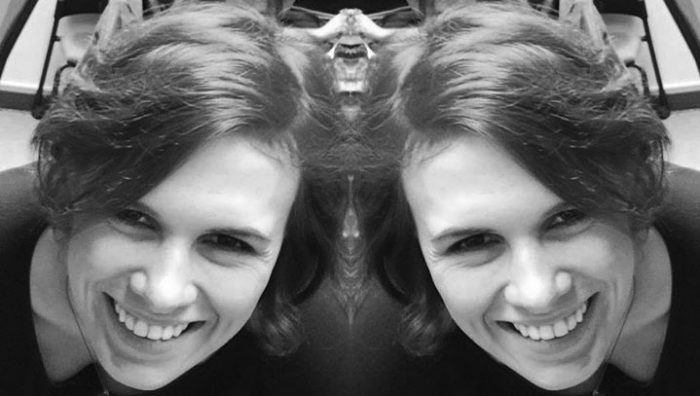
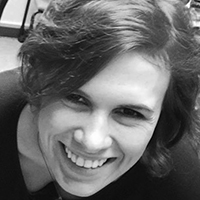 Kym Cunningham will receive her MFA from San José State University with emphases in creative nonfiction and poetry. She is the lead Nonfiction Editor of Reed Magazine, the oldest literary magazine West of the Mississippi. She received the Ida Fay Sachs Ludwig Memorial Scholarship and the Academy of American Poets Prize for outstanding achievement in her writing. Her writing has been published in Drunk Monkeys and Reed.
Kym Cunningham will receive her MFA from San José State University with emphases in creative nonfiction and poetry. She is the lead Nonfiction Editor of Reed Magazine, the oldest literary magazine West of the Mississippi. She received the Ida Fay Sachs Ludwig Memorial Scholarship and the Academy of American Poets Prize for outstanding achievement in her writing. Her writing has been published in Drunk Monkeys and Reed.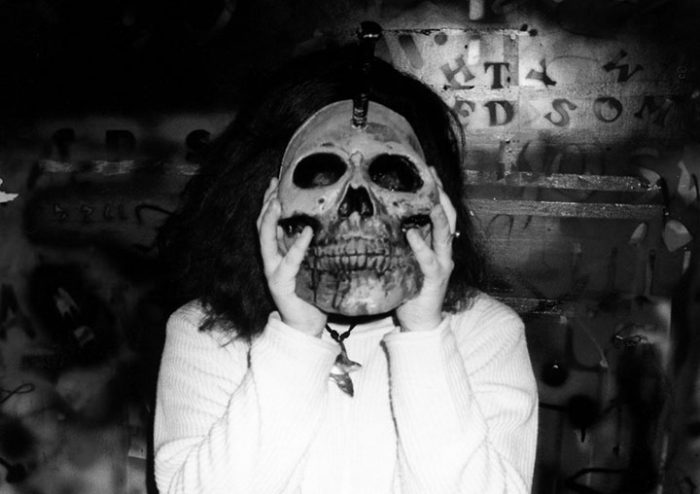
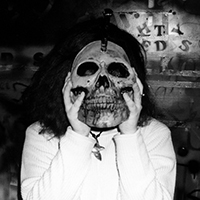 Victoria-Elizabeth Panks is a writer who was brought up along the central coast of California and the northern shores of Lake Michigan, but finds herself living, inexplicably, within the southern suburbs of New Jersey, where she translates French symbolist poetry and writes fanciful speculative fiction. She is currently at work on her second novel.
Victoria-Elizabeth Panks is a writer who was brought up along the central coast of California and the northern shores of Lake Michigan, but finds herself living, inexplicably, within the southern suburbs of New Jersey, where she translates French symbolist poetry and writes fanciful speculative fiction. She is currently at work on her second novel.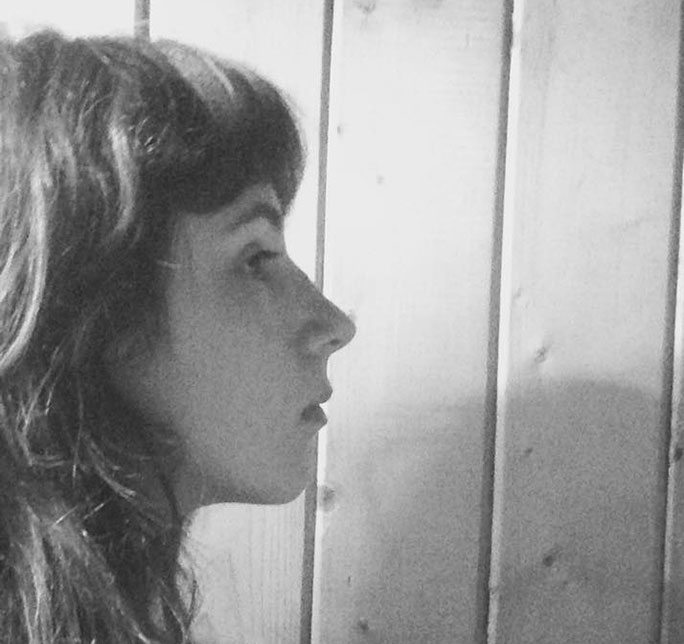
 Sarah Blumrich was born in 1996 in New Jersey and raised in a small Connecticut town. An undergraduate at Stony Brook University, she is an aspiring screenwriter, novelist, and poet. She is majoring in film and minoring in creative writing, Japanese, and German. This is her first time being published in a literary journal.
Sarah Blumrich was born in 1996 in New Jersey and raised in a small Connecticut town. An undergraduate at Stony Brook University, she is an aspiring screenwriter, novelist, and poet. She is majoring in film and minoring in creative writing, Japanese, and German. This is her first time being published in a literary journal.
 Jennifer Vanderheyden grew up in southern Ohio, and earned a PhD in French Literature from the University of Washington in Seattle. She lives in Wisconsin and teaches French at Marquette University. She has published a critical study on the works of eighteenth century French writer and philosopher Denis Diderot, as well as piece of flash fiction in Robert Vaughan’s Flash Fiction Fridays (Dolls, Vol. 1, 2011)
Jennifer Vanderheyden grew up in southern Ohio, and earned a PhD in French Literature from the University of Washington in Seattle. She lives in Wisconsin and teaches French at Marquette University. She has published a critical study on the works of eighteenth century French writer and philosopher Denis Diderot, as well as piece of flash fiction in Robert Vaughan’s Flash Fiction Fridays (Dolls, Vol. 1, 2011)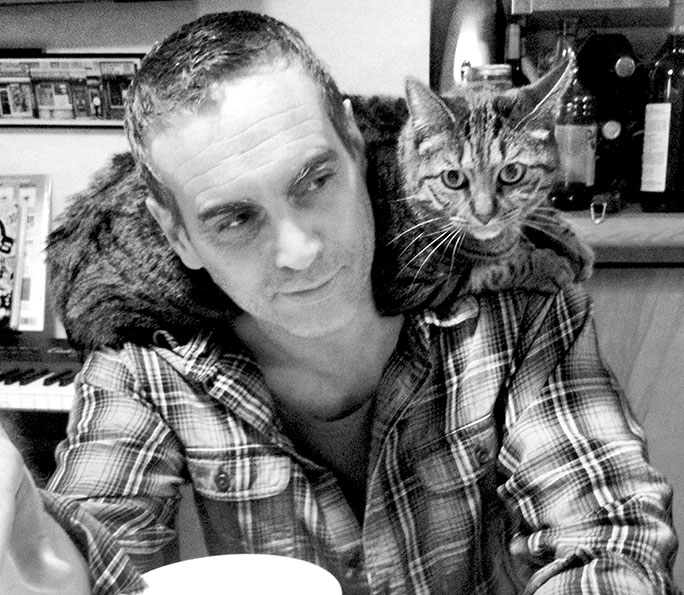
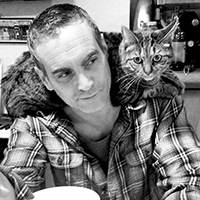 Seth King is a painter and poet living in Brooklyn, NY with his wife and two boys. His recent poetry has been published in The Furious Gazelles, Yellow Chair Review, and will be in an upcoming issue of 805 Lit + Art. See more at
Seth King is a painter and poet living in Brooklyn, NY with his wife and two boys. His recent poetry has been published in The Furious Gazelles, Yellow Chair Review, and will be in an upcoming issue of 805 Lit + Art. See more at 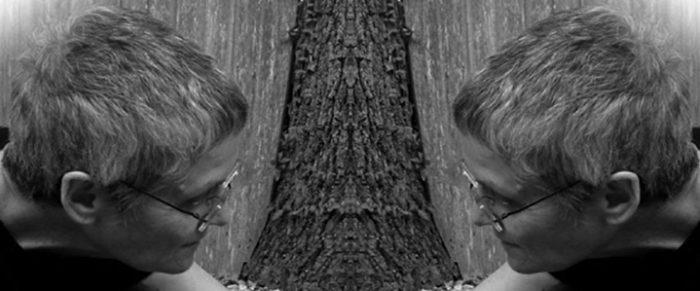
 Judith Roitman has most recently published in Yew, Futures Trading, Otoliths, Eleven Eleven, Horse Less Review, and Talisman. Her recent chapbooks include Slackline (Hank’s Loose Gravel Press), Furnace Mountain (Omerta), Ku: a thumb book (Airfoil Press) and Two: ghazals (Horse Less Press). Her book No Face: Selected and New Poems (First Intensity) appeared in 2008. She lives in Lawrence, KS.
Judith Roitman has most recently published in Yew, Futures Trading, Otoliths, Eleven Eleven, Horse Less Review, and Talisman. Her recent chapbooks include Slackline (Hank’s Loose Gravel Press), Furnace Mountain (Omerta), Ku: a thumb book (Airfoil Press) and Two: ghazals (Horse Less Press). Her book No Face: Selected and New Poems (First Intensity) appeared in 2008. She lives in Lawrence, KS.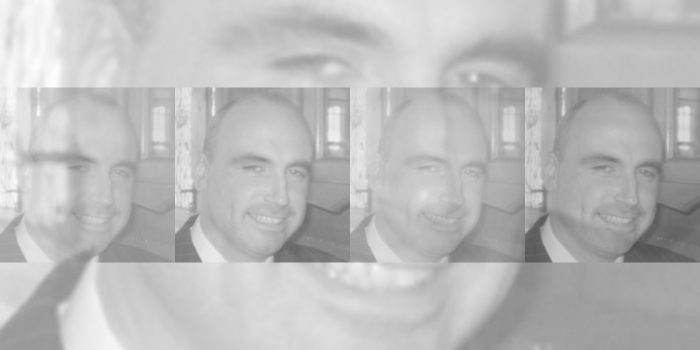
 Martin Keaveney has been widely published in Ireland, the UK and the US. Fiction, Poetry and Flash may be found at
Martin Keaveney has been widely published in Ireland, the UK and the US. Fiction, Poetry and Flash may be found at 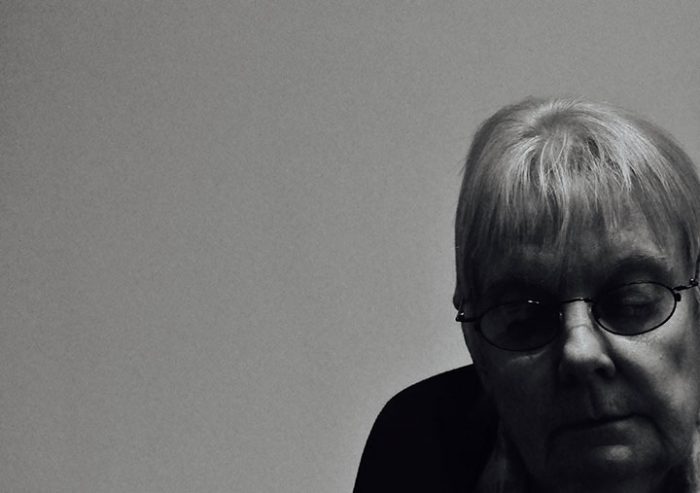
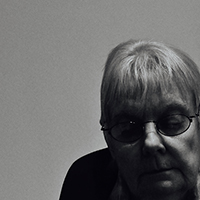 M. F. McAuliffe is co-author of the poetry collection Fighting Monsters (Melbourne, 1998), & the limited-edition artist’s book Golems Waiting Redux (Portland, 2011). Her novella, Seattle, was published in 2015; her collection, The Crucifixes and Other Friday Poems, will be published this fall.
M. F. McAuliffe is co-author of the poetry collection Fighting Monsters (Melbourne, 1998), & the limited-edition artist’s book Golems Waiting Redux (Portland, 2011). Her novella, Seattle, was published in 2015; her collection, The Crucifixes and Other Friday Poems, will be published this fall.
 Christina Bavone is a teacher and writer of fiction and poetry. She currently teaches writing at National Louis University. She holds a Bachelors in writing from Columbia College and a Masters in teaching from National Louis University. She is currently pursuing a Masters in English at University of Illinois at Chicago as a part of their Program for Writers. She has published poems in online lit mag Ophelia Street and international publication Every Second Sunday. In addition to teaching and writing, Christina is mother to a boisterous 4-year-old.
Christina Bavone is a teacher and writer of fiction and poetry. She currently teaches writing at National Louis University. She holds a Bachelors in writing from Columbia College and a Masters in teaching from National Louis University. She is currently pursuing a Masters in English at University of Illinois at Chicago as a part of their Program for Writers. She has published poems in online lit mag Ophelia Street and international publication Every Second Sunday. In addition to teaching and writing, Christina is mother to a boisterous 4-year-old.



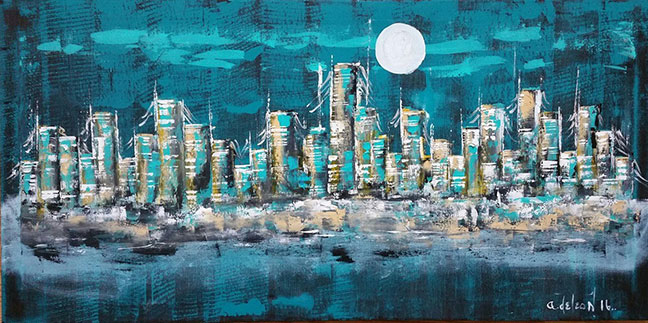








 Stephanie Renae Johnson is the Editor-in-Chief of The Passed Note, a lit mag for young adult readers by adult writers. She is also a recent graduate of Lenoir-Rhyne University’s Master of Arts in Writing program and has just finished her first book of poetry. Her work has been published by Parenthetical and Penny, among others. She was a finalist for the 2016 Claire Keyes poetry award, judged by the award winning poet Ross Gay. She lives in Asheville, North Carolina, with her fiancé and their seven bookshelves.
Stephanie Renae Johnson is the Editor-in-Chief of The Passed Note, a lit mag for young adult readers by adult writers. She is also a recent graduate of Lenoir-Rhyne University’s Master of Arts in Writing program and has just finished her first book of poetry. Her work has been published by Parenthetical and Penny, among others. She was a finalist for the 2016 Claire Keyes poetry award, judged by the award winning poet Ross Gay. She lives in Asheville, North Carolina, with her fiancé and their seven bookshelves.
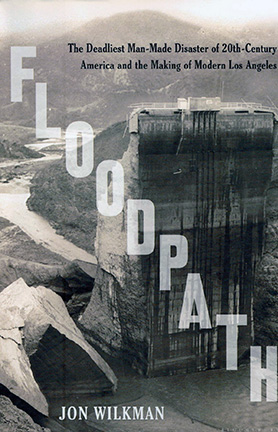

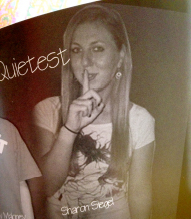
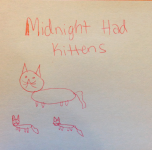
 Shay Siegel is from Long Island, New York. She received a B.A. in English from Tulane University in New Orleans where she was a member of the Women’s Tennis Team. She recently completed an MFA in Fiction at Sarah Lawrence College. Her writing has appeared in The Montreal Review, Burning Word, Mouse Tales Press, The Cat’s Meow for Writers and Readers, The Rusty Nail Literary Magazine, Belleville Park Pages, Black Heart Magazine and Extract(s). Her website is
Shay Siegel is from Long Island, New York. She received a B.A. in English from Tulane University in New Orleans where she was a member of the Women’s Tennis Team. She recently completed an MFA in Fiction at Sarah Lawrence College. Her writing has appeared in The Montreal Review, Burning Word, Mouse Tales Press, The Cat’s Meow for Writers and Readers, The Rusty Nail Literary Magazine, Belleville Park Pages, Black Heart Magazine and Extract(s). Her website is 











 My illustrations are primarily rendered in pen and ink on paper. I am inspired by strong, trailblazing, bad-ass women who push boundaries, forge their own paths, and define for themselves what it means to achieve success. I am also inspired by the take-no-shit attitude of the ’90s and transformative self-expression made possible through art, poetry and music.
My illustrations are primarily rendered in pen and ink on paper. I am inspired by strong, trailblazing, bad-ass women who push boundaries, forge their own paths, and define for themselves what it means to achieve success. I am also inspired by the take-no-shit attitude of the ’90s and transformative self-expression made possible through art, poetry and music.
 Janet Buck is a seven-time Pushcart Nominee and the author of four full-length collections of poetry. More than 4,000 of her poems & pieces of prose are in print and on the internet. Janet’s recent work has appeared in The Birmingham Arts Journal, Antiphon, Offcourse, PoetryBay, Vine Leaves, Poetrysuperhighway, Misfit Magazine, Lavender Wolves, and River Babble. Her latest print collection of verse, Dirty Laundry, is currently available at Amazon, Barnes & Noble & other outlets. Visit the ordering link at her new web page:
Janet Buck is a seven-time Pushcart Nominee and the author of four full-length collections of poetry. More than 4,000 of her poems & pieces of prose are in print and on the internet. Janet’s recent work has appeared in The Birmingham Arts Journal, Antiphon, Offcourse, PoetryBay, Vine Leaves, Poetrysuperhighway, Misfit Magazine, Lavender Wolves, and River Babble. Her latest print collection of verse, Dirty Laundry, is currently available at Amazon, Barnes & Noble & other outlets. Visit the ordering link at her new web page: 
 A Pushcart nominee, Lana Bella is the author of two chapbooks, Under My Dark (Crisis Chronicles Press, 2016) and Adagio (forthcoming from Finishing Line Press). She has had her poetry and fiction featured in over 200 journals including Columbia Journal, Poetry Salzburg Review, and Third Wednesday, among others. She resides in the U.S. and the coastal town of Nha Trang, Vietnam, where she is a mom to two far-too-clever frolicsome imps.
A Pushcart nominee, Lana Bella is the author of two chapbooks, Under My Dark (Crisis Chronicles Press, 2016) and Adagio (forthcoming from Finishing Line Press). She has had her poetry and fiction featured in over 200 journals including Columbia Journal, Poetry Salzburg Review, and Third Wednesday, among others. She resides in the U.S. and the coastal town of Nha Trang, Vietnam, where she is a mom to two far-too-clever frolicsome imps.
 Robert Boucheron is an architect in Charlottesville, Virginia. His short stories, essays and book reviews appear in Bangalore Review, Digital Americana, Fiction International, New Haven Review, North Dakota Quarterly, Poydras Review, Short Fiction, The Tishman Review.
Robert Boucheron is an architect in Charlottesville, Virginia. His short stories, essays and book reviews appear in Bangalore Review, Digital Americana, Fiction International, New Haven Review, North Dakota Quarterly, Poydras Review, Short Fiction, The Tishman Review.


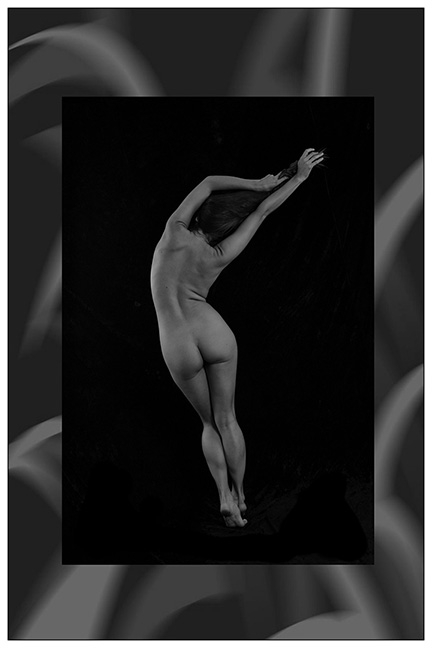


 Ashley Inguanta is a small-press author, photographer, and yoga teacher who has dedicated her life to helping others heal by developing healthy coping mechanisms. She earned her MFA in Creative Writing from The University of Central Florida in 2011, and she earned her 200 hour RYT certificate from YOGAMAYA New York in 2014. She is the author of The Way Home (Dancing Girl Press, 2013 / re-published with The Writing Disorder on Kindle), For the Woman Alone (Ampersand Books 2014), and Bomb, which is forthcoming with Ampersand Books this fall. As a mental health advocate and queer rights advocate, she’s volunteered with organizations and facilities like Equality Florida and Lakeside Alternative, and currently she teaches healing, restorative writing and yoga classes at several locations in Central Florida.
Ashley Inguanta is a small-press author, photographer, and yoga teacher who has dedicated her life to helping others heal by developing healthy coping mechanisms. She earned her MFA in Creative Writing from The University of Central Florida in 2011, and she earned her 200 hour RYT certificate from YOGAMAYA New York in 2014. She is the author of The Way Home (Dancing Girl Press, 2013 / re-published with The Writing Disorder on Kindle), For the Woman Alone (Ampersand Books 2014), and Bomb, which is forthcoming with Ampersand Books this fall. As a mental health advocate and queer rights advocate, she’s volunteered with organizations and facilities like Equality Florida and Lakeside Alternative, and currently she teaches healing, restorative writing and yoga classes at several locations in Central Florida.
 Tom W. Miller lives an ordinary life yet finds insight and entertainment from his everyday experiences. He has published a previous story in Red Fez and lives in Virginia’s Shenandoah Valley with his family.
Tom W. Miller lives an ordinary life yet finds insight and entertainment from his everyday experiences. He has published a previous story in Red Fez and lives in Virginia’s Shenandoah Valley with his family.

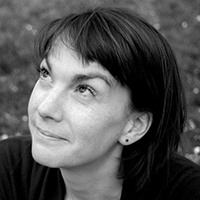 Ruby Cowling is a British writer currently living in London. Her work has won awards that include, The White Review Short Story Prize and the London Short Story Prize, and has been shortlisted in contests from Glimmer Train, Short Fiction, and Aesthetica, among others. Recent anthology credits include I Am Because You Are (a Freight Books collection of work inspired by the theory of General Relativity); Flamingo Land and Other Stories, from Flight Press; and Unreal City: Constructing the Capital, a book of fiction and non-fiction about London, from Cours de Poétique.
Ruby Cowling is a British writer currently living in London. Her work has won awards that include, The White Review Short Story Prize and the London Short Story Prize, and has been shortlisted in contests from Glimmer Train, Short Fiction, and Aesthetica, among others. Recent anthology credits include I Am Because You Are (a Freight Books collection of work inspired by the theory of General Relativity); Flamingo Land and Other Stories, from Flight Press; and Unreal City: Constructing the Capital, a book of fiction and non-fiction about London, from Cours de Poétique.











